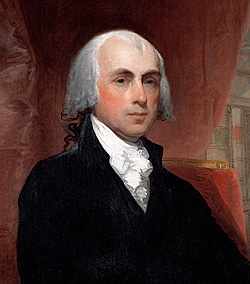This Country must be united. If persuasion does not unite it, the sword will. He begged that [4] this consideration might have its due weight. The scenes of horror attending civil commotion can not be described, and the conclusion of them will be worse than the term of their continuance. The stronger party will then make traytors (sic) of the weaker; and the Gallows & Halter will finish the work of the sword. . . . .State attachments, and State importance have been the bane of this Country. We can not annihilate; but we may perhaps take out the teeth of the serpents.
Or
Morris made these comments in opposition to small state calls for equal representation in the Senate. On the other hand, he did not favor making the Senate proportional to population, either. His proposed "compromise" was to have a Senate appointed by the executive and holding their offices for life! Senators for life would probably live in several states over a lifetime and therefore not represent any one state. On the other hand, when the Great Compromise was finally reached it was Morris (together with Rufus King of Massachusetts) who proposed to give each state an equal number of Senators provided they voted as individuals. And at the end he even moved that no future amendment could deprive a state of equal representation in the Senate without its consent.
Morris favored ratification by convention instead of by state legislatures for the same reason as other nationalists -- that states lacked authority to ratify the Constitution, and that the Framers should appeal over the states to the people. However, he took this idea further than any other nationalist, proposing a singe national ratifying convention instead of multiple state conventions. Morris wanted to give the federal government power to regulate elections for the House but not the Senate, to enact bankruptcy laws, to have sole authority over treason and embargoes, and to interfere in states' internal policy in at least some instances, such as to forbid paper money. He believed the federal government should be able to suppress a insurrection against state authority without waiting for the state's request.
On the other hand, he opposed a Congressional veto of state laws as "terrible to the states," and believed that the power of federal courts to strike down state laws conflicting with federal enactments as sufficient. He even questioned whether it would be necessary for Congress to meet every year, since the public business might not require it. (This may have been an attempt to strengthen the power of the executive).







